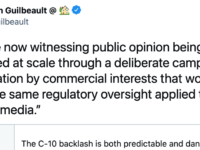The Canadian government’s support for net neutrality has long stood as a foundational principle of its approach to the Internet. In 2017, Prime Minister Justin Trudeau said he would defend net neutrality and expressed concern about the attacks on net neutrality in the U.S. That same year, Heritage Minister Melanie Joly made net neutrality a foundational part of Canadian cultural policy, stating that “as a government, we stand by the principle of net neutrality.” ISED Minister Navdeep Bains adopted the same position, stating “Net neutrality is one of the critical issues of our times, much like freedom of the press and freedom of expression before it.”
Given that freedom of expression is taking a back seat in Bill C-10 with the regulation of user generated content, perhaps it was inevitable that the government would also reverse its position on net neutrality. Canadian Heritage Minister Steven Guilbeault recently gave an interview to the Toronto Star in which he appears to back away from supporting net neutrality, equating it to any Internet regulation:











